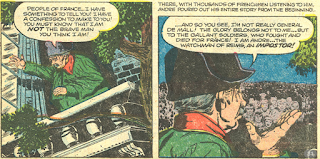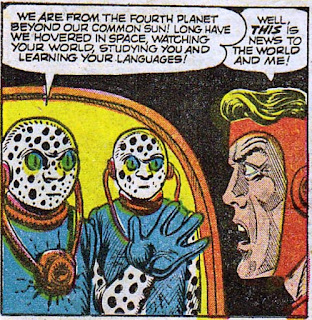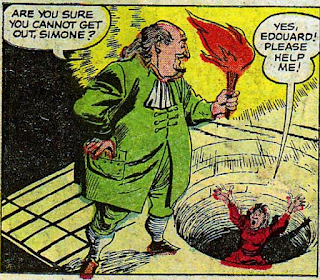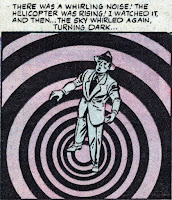Horror Comics
Astonishing #38
Cover by Carl Burgos
"The Man Who Didn't Belong!" (a: Paul Reinman) ★★★
"It Waits in Space!" (a: Robert Q. Sale) ★★1/2
"For the Birds" (a: Mort Lawrence) ★★
"Pleasant Dreams, Sir!" (a: Hy Rosen) ★
"The Dungeon" (a: Tony DiPreta) ★1/2
Willy has always felt as though the world despised him; being homely didn't help. So Willy became a seaman, working where few could bother him. One day, while out at sea, Willy overhears a conversation between two scientists traveling on Willy's ship about the strange caskets stored below deck. The men reveal that the boxes contain an experimental life form, a near-perfect human android.
That night, disaster strikes when the liner hits an old World War II mine and sinks. All crew and cargo are lost except for Willy, who drifts to a nearby island courtesy of one of the mysterious caskets. When he opens the box, Willy discovers a beautiful android who has no preconceived notions of beauty and wants only to make her new master happy.
Willy names his new friend Andra and life on the island becomes magical but, in the back of his mind, he knows he'll miss civilization eventually and that they must be rescued at some point. Salvation arrives in the form of a passing ship but, as Willy is about to light a bonfire, he realizes everything he ever wanted is right here on this deserted island.
"The Man Who Didn't Belong!" is an easygoing fantasy that veers away from the maudlin and also, thankfully, steers clear of the "revenge" factor. Willy accepts his standing in life; he doesn't plot bank robberies or world domination but, instead, seeks happiness elsewhere. Perhaps the coming of the Code precluded the finale where we discover that Andra must eat human flesh to keep her gears spinning. The moment when the lightbulb goes on over our protagonist's head is genuinely heartwarming. There, I said it.
Space pilot Norman Hall is attempting to break the altitude record when his ship runs out of gas and he drifts aimlessly in space. A huge ship comes along and pulls his craft in. When he disembarks, Norman's greeted by friendly aliens who tell him they're from the "fourth planet beyond our common sun" and confess they've had their eye on the violent planet Earth. Does Earth plan an invasion?
Though Norm answers "No, certainly not," the creatures strap him into a truth chair and grill him. Once the aliens leave the room to study the data they've retrieved from their guest, Norman escapes and boards his ship, releasing it out into space. Knowing the ship will crash on Earth, Norman makes peace with himself but is elated when he discovers the aliens have guided his super-jet down to a safe landing. Obviously, they liked Norman's answers. A few months prior, "It Waits in Space!" might have ended with Norman discovering the aliens had let him go because they'd loaded his ship with a deadly toxin or a similarly dark wrap-up, but a more optimistic outlook seems to have been the order of the day. We'll see.
Melvin has been the taste tester for Mr. Boulder's Bird Feed Company for twenty years and he's never gotten a raise. His boss, Mr. Boulder, is a sadistic tyrant who keeps Melvin in a cage but the bright side is that, after two decades of eating bird feed, Melvin has sprouted a huge pair of wings. Mr. Boulder, seeing Melvin fly for the first time, wants to play too and begins eating his own feed. For some reason known only to uncredited scripters, Boulder grows wings quickly, eschewing the 20-year route. But, to Melvin's delight, Boulder is now a chicken and Melvin is a chicken hawk. Raaaawk! Perfect title here, as this one is "For the Birds!"
In the unremarkable "Pleasant Dreams, Sir," a man enters a steam room and sees an alien from outer space. He's taken captive by the alien and is about to be killed when he wakes up, walks into a steam room and sees an alien from outer space… (yawn). In the equally predictable "The Dungeon," Edouard marries the "ugliest woman in France" in order to gain her riches and estate. Shortly after the honeymoon, he dumps his wife in a dungeon cell and leaves her to starve as he searches for prettier company. After the funeral, Edouard marries a lovely girl… who dumps him into the same dungeon cell to rot. Some nice Tony DiPreta art here, but don't bother reading the little word boxes.-Peter
Journey Into Unknown Worlds #34
"Personality Zero" (a: Paul Reinman) ★
"When Ends the Dream" (a: Angelo Torres and Frank Frazetta) ★★★
"Double or Nothing" (a: Ed Winiarski) ★★1/2
"The Man Who Vanished!" (a: Joe Kubert) ★★★
 |
"Personality Zero" is a mess in both script and art chores. There's no good reason for Tom to take an interest in Lien but then, inexplicably, Tom disappears on page 2, never to be seen again. The final reveal, a panel of celebratory Martians, would be a surprise if the (uncredited) scripter didn't find it necessary to throw a "Mr. A. Lien" wink-wink-reminder every couple panels. We know this guy's from outer space from the get-go. Where's the surprise? Paul Reinman's art looks hurried and unfocused.A man awakens from a nightmare to find that everything around him has changed. Is he still dreaming? "When Ends the Dream" is nothing more than a vignette but it's got a nifty twist in its final panel and the art crew cannot be ignored. This was Frank Frazetta's first full-length work for Marvel/Atlas (he had done a few one-page public service announcements and a cover for The Phantom Rider #2, but that's about it) and his style overpowers Angelo Torres's pencils.
In "Double or Nothing," a space expedition lands on a planet of duplicates. Every plant, every rock, every river has a twin but the secret is that one is good and the other evil. The boys find this out when they attempt to study a fern and the plant eats one of the astronauts. Running back to their ship, the two surviving explorers discover there are now two rockets. But which one is good and which one bad? And which one holds the evil twin astronauts? Though poorly visualized (Ed Winiarski is celebrating his 50th contribution to the Atlas oeuvre), "Double or Nothing" is a fun space opera with a potent final panel.
A trio of buddies go hunting for raccoon and jaw about the supernatural. Charley and Al scoff at the existence of the devil, but Ben is a believer and makes a wager: he bets his partners five bucks each that they won't sign a contract handing over their souls to the devil. Charley demurs but Al grabs the paper and signs. The wail of hounds indicates the boys have trapped a raccoon and they head off into the woods. Al sees something dark "with luminous eyes and horns" just as Ben disappears, gone forever.
 |
Cover by Sol Brodsky & Carl Burgos
"Meet Maggie" (a: Sid Greene) ★
"The Lonely Little Boy!" (a: Vince Colletta) ★★
"Inside the Box" (a: Ed Winiarski) ★★
"The Talking Dog" (a: Bob Powell) ★★
"The Coward!" (a: Mac Pakula) ★★1/2
In the futuristic "The Lonely Little Boy," Bobby's parents have become concerned over his lack of social manners and the way the boy is slowly but surely crawling back into his shell. They seek the advice of a psychiatrist, who recommends they have a twin robot fashioned for Bobby to pal around with. The experiment is a success and Bobby is a happy, playful child once again. Only problem is, Bobby's "twin," Billy, wants to be Bobby. "The Lonely Little Boy!" has an intriguing hook and a creepy premise but doesn't follow through, instead settling for the maudlin and a climactic public service message about parenting.
A similar message about beauty being skin deep (or something like that) can be found at the end of "Inside the Box." Roby Wicker is given a box and told it's been willed to him by his dead uncle. Determined to share his newfound wealth with his friends, Roby heads down to the local market where his pals hang out around the stove and gossip about the other townies. When Roby opens the box, he finds a small glass tube and instructions from his uncle to point it at someone and Roby will see their true colors. Roby's friends aren't the kind souls he thought they were. More really rough art here by Winiarski.
 |
“Stop” (a: Bill Benulis & Jack Abel) ★★1/2
“The Brain” (a: John Forte) ★★1/2
“The Man in the Rain” (a: Jack Katz) ★★★
“The Unseen!” (a: John Tartaglione) ★
Several people take a break and "Stop" to consider their actions when they come upon a stop sign in the road. Ironically, the sign is in the wrong place and will be moved. Benulis and Abel contribute decent art to a little morality play that is more a slice of life than a mystery tale.


Jack Katz's art is interesting and looks forward to what we'd later think of as an underground style. The idea that soldiers would mistake a large statute in a famous square for a human being is a bit far-fetched.
Strange Tales #35
"The Man in the Bottle!" (a: Ed Winiarski) ★1/2
"The Target!" (a: John Romita) ★★1/2
"The Character" (a: Dick Ayers) ★1/2
"Freddie’s Face!" (a: Art Peddy) ★
Fisherman Adam Halley catches "The Man in the Bottle," who promises great riches and power if he's let out. Nosy reporters see the bottle so, to distract them, Adam buys 1000 bottles and puts 1000 dolls in them; he sets them afloat and claims it was all a publicity stunt. At home, he lets the man out of the bottle and finds himself bottled up in his place, since the one who gets out replaces himself with the one who frees him. Halley floats on the ocean and is picked up by another fisherman, but this guy tosses him back, convinced it's one of the bottles from the publicity gag.
That's a lot of plot twists for a five page story, and the whole thing is far-fetched. I can buy the genie in the bottle who replaces himself with the person who frees him, but a rush order of 1000 bottles and 1000 male dolls just to trick reporters? That's the kind of clunky plot development that makes stories like this not work.
Young Randy builds a model spaceship and dreams of space travel, but his parents tell him it'll never happen. He speaks with two scientists, who agree with Mom and Dad. When Randy finally goes out to play with the other kids, he discovers a wrecked spaceship in a ravine! What he doesn't know is that his parents were among a thousand refugees who left a war-mad planet, the same planet that Randy is obsessed with--Earth.
Perhaps the kids who bought and read these comics in 1955 had never read any science fiction stories before and were surprised by the ending of "The Target!" I know I wasn't. Still, it's nice to see early work by John Romita, who would make such a splash at Marvel in the '60s.
The half-page splash panel by Dick Ayers and Ernie Bache is the only reason to spend any time on this pointless four-pager.
"Freddie's Face!" is so ugly that he can't stand to see his reflection in a mirror. A pretty girl at the office tells him to change his attitude, but he stays homely. Finally, he takes a job as a lighthouse keeper. In his isolation he grows handsome, but without mirrors or other people, he doesn't realize it.
I suppose I need to get used to coming to the end of an Atlas story and thinking, "that makes no sense." That's the case with "Freddie's Face!" What's the point?-Jack
Uncanny Tales #30
“Collector’s Item!” (a: Bill Benulis) ★★1/2
“Stumblebum” (a: Sid Greene) ★★1/2
“One in a Million” (a: Ed Winiarski) ★★
“First Prize!” (a: John Forte) ★1/2





















5 comments:
"The Man Who Didn't Belong" sounds just like the TWILIGHT ZONE episode "The Lonely," except with a happy ending for both characters. It sounds so similar that I'm surprised there wasn't legal trouble when that episode came out.
(I know that comics stories made from other stories have had trouble like that, but I imagine the opposite thing has happened.)
Grant, I don't know why your comment is not showing up on the post, but I agree with you about the comparison to the Twilight Zone episode, "The Lonely." I doubt that anyone would have remembered the comic book story by the time the show aired in 1959 and I'm too big a fan of Rod Serling to think he'd take an idea from a source without giving credit. It's probably an example of an idea floating around in the ether that more than one person pulled out and wrote down.
Thank you.
"The Brain" makes me think of one of "The Scary Door" segments from "Futurama":
"Robot, experience the irony for me!"
"NOOOOOO!"
Love it!
Post a Comment